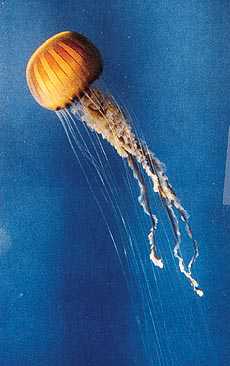
Jellies pulse less frequently at night.
Los Angeles
Scientists, including one of Indian origin, have found that jellyfish go into a sleep-like state, making them the first animals without a brain or central nervous system to do so.
The findings push the origin of sleep further down the evolutionary tree of life - to before the emergence of a centralised nervous system.
Follow The Tribune on Facebook; and Twitter @thetribunechd)
"It is the first example of sleep in animals without a brain," said Howard Hughes, from California Institute of Technology in the US.
Researchers studied Cassiopea, a mostly stationary jellyfish native to mudflats, mangrove swamps, and other warm, shallow waters. The jellfish were kept in tanks with artificial seawater in labs.
Cassiopea do not look like typical jellyfish - they are silver dollar-sized, splotched with black pigment, and rest upside-down on the sea floor, researchers said.
With tentacles curled above bell-shaped bodies, the jellies resemble miniature heads of cauliflower. However, they pulse like other jellyfish, contracting and relaxing in a steady rhythm, and researchers wondered if the behaviour was continuous.
"We went in at night and videotaped them with an iPhone," said Ravi Nath, graduate student at Caltech.
After recording the jellies, the team got their first clue that Cassiopea might be sleeping: They pulsed less frequently at night.
Researchers then created an image processing programme to count the pulses of 23 jellies over six consecutive days and nights.
They observed, as earlier, that pulsing activity ebbed at night but a little food dropped in the tanks could quickly wake the jellies up again. Researchers noted a second sign of sleep after dropping the floor out from dozing jellies. The team placed Cassiopea inside a pipe with a mesh bottom and then dipped the pipe into the tank - so submerged jellies rested on the mesh instead of the tank floor.
Then they lowered the pipe deeper into the tank, forcing the jellies to lift off the mesh and float in open water.
During the day, Cassiopea will quickly pulse their bells and swim down to rest on the mesh again. However, at night, it takes them about three times longer to start pulsing.
It is like the jellyfish are a little groggy. This delayed response to stimulation is typical for sleeping animals, researchers said.
The study was published in the journal Current Biology. —PTI



























